Seven leaders make Boilermaker “watch list” for 110th Congress
Democrats needed to win 15 seats to take control of the House of Representatives in last November’s midterm elections. They captured 29. Much of their success has been attributed to the strong get-out-the-vote effort of organized labor, including the Boilermakers union and our legislative program — LEAP. A high percentage of labor’s vote went to pro-worker candidates ― largely Democrats, but some Republicans as well. Now, as the new majority party, Democrats will set the House’s legislative agenda. They will also take over the chairmanship of the House’s 21 committees, which have been dominated by Republicans since 1995. The Boilermakers and labor-at-large will look to the House majority party to introduce pro-labor bills and keep anti-worker measures from being considered on the floor.
The opportunities for unions and working families to benefit from this power shift are substantial. But so are the challenges. George W. Bush still has two years remaining in his presidency, and the Democratic majority is not large enough to override his vetoes without help from Republican congressmen. (A two-thirds majority is required to defeat a veto.) Moreover, the Democratic majority includes 44 moderate and conservative Democrats (“blue dogs”), whose positions may often conflict with those of the House leadership.
According to political analysts, for Democrats to take advantage of their victory, they must have party unity and stay focused on achievable goals. Their leaders must rise to the occasion. The success or failure of the 2006 Democratic power shift may well rest upon the shoulders of key Democratic leaders like those profiled below.
Nancy Pelosi (D-CA 8th), speaker of the House
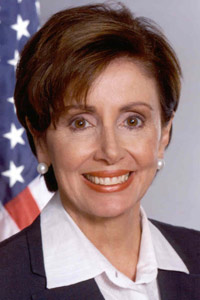
“Without Nancy Pelosi as Democratic leader in the House, the last four years would have been a lot worse. We heard much about the terrible policies that the Republican leadership passed, but we didn’t always hear about what they could not get done because Pelosi was successful at holding Democrats together. The best example of her work was keeping Social Security privatization off the House floor.” — Bridget Martin, director of government affairs
IN JANUARY THE 110th Congress elected Rep. Nancy Pelosi (D-CA 8th) speaker of the House of Representatives. She is the first woman ever to hold this position. House speaker is one of the most powerful and visible political offices in the country. In her new role, Pelosi, 66, will decide which measures will be considered in the House, and she will control the floor proceedings. The position of speaker is also second in the line of succession to the U.S. presidency (after the vice president).
Pelosi’s selection as speaker was all but assured after Democrats captured 29 House seats and took over majority status. Although all House members may vote for the speaker, the ruling party typically controls the election because it has more votes.
Endorsed by organized labor, Pelosi has received high marks for voting in support of measures important to unions. In 2005, the Boilermakers rated her voting record at 75 percent; the AFL-CIO rated her even higher, at 93 percent.
Pelosi’s district includes most of the city and county of San Francisco and is widely considered a bastion of progressive politics. In the 2006 midterm elections, Pelosi received 81 percent of the vote in her district, easily defeating her Republican challenger. First elected as a U.S. congresswoman in 1988, Pelosi has been reelected nine times, always by wide margins. She has served on the Appropriations and Intelligence Committees and in 2001 was elected the House minority whip. A year later, House Minority Leader Dick Gephardt resigned his position to campaign for the Democratic presidential nomination, and Democrats elected her to replace him.
According to Washington Post staff writer Lois Romano, “[Pelosi] has proved to be a tough-minded tactician who has led her caucus from the political center and kept the fractious House Democrats in line.” Her outspokenness, support of progressive issues, and hard-nosed approach to politics earned her the ire of right-wing politicians, many of whom chose to make her a focus of negative campaigning in 2006 — a strategy some analysts say may have backfired on Republicans.
Key legislative/political positions
Over the past several years, Pelosi has supported most of the legislative positions taken by the Boilermakers. She voted to strengthen OSHA, to protect overtime pay, and to repeal tax breaks for companies exporting jobs. She also voted against free trade treaties with Oman and with the Dominican Republic and Central America. She is a cosponsor of the Employee Free Choice Act, a bill that would make it easier for workers to join a union and discourage employers from interfering with organizing drives.
Steny Hoyer (D-MD 5th), majority leader
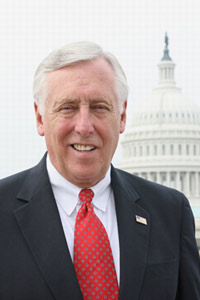
“Congressman Hoyer is a skilled legislator. He recently forced Republicans to scuttle budget legislation that included a number of cuts in programs important to labor and working families by attaching an increase in the minimum wage to the bill.” — Abe Breehey, assistant director of government affairs
BY A 149-86 VOTE, Democratic congressmen last November elected Steny Hoyer (D-MD 5th) House majority leader over Rep. John Murtha (D-PA 12th). In his new position, Hoyer is second in command to speaker Nancy Pelosi. His duties will include scheduling legislation for consideration on the House floor, helping to plan legislative agendas, and seeking to line up support on positions of the majority party.
Hoyer, widely considered as a centrist, is endorsed by organized labor. In 2005, the Boilermakers rated his voting record at 75 percent, while the AFL-CIO scored him a perfect 100 percent.
Hoyer’s district includes portions of Prince George and Anne Arundel counties as well as the three counties making up southern Maryland ― Calvert, Charles, and St. Mary’s ― in an area bordering Washington, D.C.
In the 2006 midterm elections, Hoyer received 83 percent of the vote in his district, easily defeating his Green Party challenger. First elected as a U.S. congressman in 1981 and reelected 12 times, Hoyer, 67, has served as a representative longer than anyone else in the history of southern Maryland. He is also the highest-ranking member of Congress in Maryland history.
From 1987 to 1989, Hoyer was the majority whip ― the fourth-ranking position in the House. From 1989 to 1994, he served as the chair of the Democratic caucus ― the third ranking position. In 2002, eight years after the Republican take-over of both houses of Congress, Hoyer was unanimously elected by his party as the deputy minority whip, the second-highest ranking position of his minority party. He held that position until being elected House majority leader.
He sits on the House Appropriations Committee, which allocates billions of dollars in federal funds each year. He also serves on the Transportation-Treasury Subcommittee and the Labor, Health and Human Services, and Education Subcommittee.
Key legislative/political positions
Over the past several years, Hoyer has supported most of the legislative positions taken by the Boilermakers. He voted to strengthen OSHA, to protect overtime pay, and to repeal tax breaks for companies exporting jobs. He also voted against free trade treaties with Oman and with the Dominican Republic and Central America. He is a cosponsor of the Employee Free Choice Act. In 1990, he was credited with helping to pass the Americans with Disabilities Act.
Hoyer has a reputation as a centrist Democrat and sometimes votes in line with those in his party who are more moderate or conservative. The Prince George Gazette said Hoyer “is in touch with the pulse of the Democratic caucus. He’s a flexible moderate, perhaps because of the growing conservative nature of his district.”
James Clyburn (D-SC 6th), majority whip
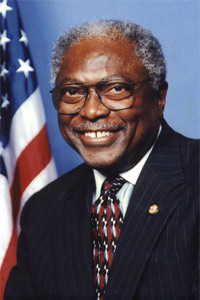
“We’ve always had a great relationship with Rep. Clyburn. He is a staunch ally of labor and a strong supporter. He will be an asset for us.” ― Bridget Martin, director of government affairs
LAST NOVEMBER, REP. James Clyburn (D-SC 6th) became the second black lawmaker in history to be elected House majority whip, the highest congressional office ever to be held by an African American. Clyburn reports to the new House majority leader, Rep. Steny Hoyer. In his new position, Clyburn is responsible for keeping members of Congress informed, marshalling support for the Democratic leadership position, and helping to coordinate legislative and floor strategy. The majority whip stays in touch with House members and provides feedback to the party leadership regarding their concerns and opinions.
Clyburn is an outspoken supporter of minority issues and a former chair of the Congressional Black Caucus. In 2005, the Boilermakers rated his voting record at 75 percent, while the AFL-CIO scored him at 93 percent.
Clyburn’s district is situated in central South Carolina. Heavily Democratic, the district was gerrymandered (restructured) in the 1990s to include rural counties with predominantly black populations as well as black precincts in Charleston and Columbia.
In the 2006 midterm elections, Clyburn received 64 percent of the vote in his district to defeat his Republican challenger, who received 34 percent. First elected as a U.S. congressman in 1992 and reelected seven times, Clyburn is 66 years old.
He was unanimously elected to chair the Congressional Black Caucus in 1998. He sits on the powerful House Appropriations Committee and also is a member of the Subcommittee on Energy and Water Development and Related Agencies and the Subcommittee on Transportation, Treasury, and Housing and Urban Development, The Judiciary District of Columbia.
Key legislative/political positions
Over the past several years, Clyburn has supported most of the legislative positions taken by the Boilermakers. He voted to strengthen OSHA and to protect overtime pay. He also voted against free trade treaties with Oman and with the Dominican Republic and Central America. He is a cosponsor of the Employee Free Choice Act.
Clyburn’s hometown newspaper, The State (Columbia, S.C.) praised him as an “unashamed advocate of his constituents.” He has been credited with successfully pushing for the integration of the 4th Circuit Court of Appeals.
Rahm Emanuel (D-IL 5th), chairman of the Democratic caucus
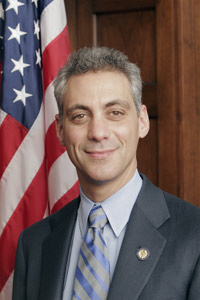
“Rep. Rahm Emanuel was charged with candidate recruitment and national fundraising to ensure that Democrats were well-positioned to take advantage of voters’ call for change in Washington. He is a fearless — some would say ruthless — politician who understands bare-knuckle politics.” — Abe Breehey, assistant director of government affairs
A FORMER CLINTON White House political advisor ― Rahm Emanuel (D-IL 5th) received his party’s nod as chairman of the Democratic caucus for the 110th Congress. Emanuel becomes the fourth-ranking Democrat in the House, an impressive achievement for a congressman with only two terms under his belt.
In his new leadership role, Emanuel will set the agenda for and preside over weekly caucus meetings as well as an annual caucus issues conference. He will also establish caucus issue task forces to develop and communicate legislative and party policy.
Like House Majority Leader Steny Hoyer, Emanuel is considered a centrist. In 2005, the Boilermakers rated his voting record at 75 percent, while the AFL-CIO scored him at 93 percent.
Emanuel’s district includes the northwest side of Chicago and parts of suburban Cook County. According to the Washington Post, the district is composed mainly of “working-class Polish and Catholic precincts.”
In the 2006 midterm elections, Emanuel won 79 percent of the vote in his district, compared to 21 percent for his Republican challenger. First elected as a U.S. congressman in 2002 and reelected twice, Emanuel, 47, got involved in politics by joining the advocacy group Common Cause while in college. He later assisted Paul Simon in his first successful U.S. Senate race in 1984. But it was his wildly successful fund-raising efforts for Chicago Mayor Richard Daley in 1989 (in which he raised $7 million) that threw Emanuel into the spotlight. He was invited to join Bill Clinton’s presidential campaign committee in 1991, and later became a trusted political advisor in the Clinton White House, serving until 1998.
As a congressman, Emanuel serves on the Ways and Means Committee. In 2005, he was picked to chair the Democratic Congressional Campaign Committee for the 2006 midterm elections.
Key legislative/political positions
Over the past several years, Emanuel has supported most of the legislative positions taken by the Boilermakers. He voted to strengthen OSHA, to protect overtime pay, and to repeal tax breaks for companies exporting jobs. He also voted against free trade treaties with Oman and with the Dominican Republic and Central America. He is a cosponsor of the Employee Free Choice Act.
George Miller III (D-CA 7th), chairman of the House Committee on Education and the Workforce
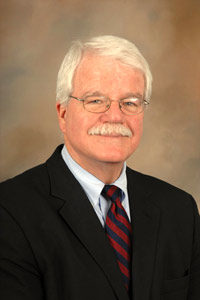
“Rep. Miller has assured labor that among his top priorities will be passage of the Employee Free Choice Act. To have a champion like George Miller at the helm of the Workforce Committee in the House means that labor’s priorities will no longer be left sitting on the back burner. Having George Miller as Chairman is an incredible asset to organized labor because he will address the issues that impact workers. ” — Bridget Martin, director of government affairs
REGARDED AS A close friend and ally of Speaker Nancy Pelosi, George Miller III (D-CA 7th) was elected December 6 by the House Democratic caucus to head the House Committee on Education and the Workforce. As its name implies, this committee addresses legislation and issues regarding education and workers. The efforts of the full committee ― and its subcommittees ― are vitally important to organized labor. The Subcommittee on Employer-Employee Relations, for example, deals with the National Labor Relations Act; pensions, health, and other employee benefits; the Employee Retirement Income Security Act (ERISA); equal employment opportunity; and civil rights in employment.
Miller is considered a progressive politician because of his support of social, environmental, and labor issues. In 2005, he received a 75 percent vote rating from the Boilermakers and a 93 percent rating from the AFL-CIO.
Miller’s district in San Francisco’s East Bay includes half of Contra Costa County, Solano County, and a tiny portion of Napa County. Major cities in the district include Richmond, Pittsburg, Vallejo, Vacaville, and portions of Concord.
In the 2006 midterm elections, Miller received 84 percent of the vote in his district to easily defeat his Libertarian challenger. First elected as a U.S. congressman in 1975, Miller, 61, has been reelected each time since then.
In addition to serving as chairman of the House Committee on Education and the Workforce, Miller is the ranking member of the House Committee on Resources, which considers legislation about fisheries and wildlife, public lands, Native Americans, irrigation and reclamation, mineral lands and mining, and oceanography. He served as chair of that committee from 1991 to 1994. Since 2003, he has chaired the Democratic Policy Committee, which helps Democrats define and articulate policies, such as the Democrats’ “New Direction for America,” a blueprint used in the 2006 midterm elections.
Key legislative/political positions
MILLER IS THE original sponsor of the Employee Free Choice Act. Supported by the Boilermakers, this act would allow workers to obtain union recognition by card check rather than secret ballot, helping to reduce employer intimidation during organizing drives. Miller also is leading the fight to raise the federal minimum wage, currently $5.15 per hour, to $7.25. This is one of the House Democratic majority’s priorities going into the 110th Congress. The federal minimum wage has not been raised in nearly a decade.
In the aftermath of Hurricane Katrina, Miller was one of the most outspoken critics of Pres. Bush’s decision to suspend Davis-Bacon protections in the Gulf. He helped marshal bipartisan opposition to the move, and he introduced a joint resolution to allow Congress to take fast-track action when a president unilaterally suspends a law. Pres. Bush subsequently reinstated Davis-Bacon.
As one of four congressional authors of the No Child Left Behind Act, Miller worked with bipartisan support to draft legislation aimed at improving teacher quality and holding schools accountable for educating all children. He continues to seek full funding for the act.
Miller has also been involved in legislative investigations of labor and human rights abuses in the U.S. Commonwealth of the Northern Mariana Islands involving women employed in the garment and tourism industries.
Charles Rangel (D-NY 15th), chairman of the Committee on Ways and Means
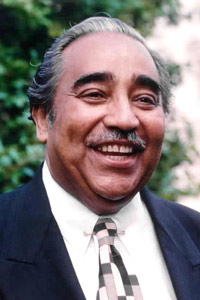
“Less than a month after the election, Rep. Rangel reached out to labor to discuss changes in the tax code that will help stop outsourcing. Corporate interests have had their every wish granted by the Republican-controlled Congress in the last 12 years. With Charlie in charge, it’s going to be a whole new ball game.” — Abe Breehey, assistant director of government affairs
OUTSPOKEN AND OFTEN controversial, Rep. Charles Rangel (D-NY 15th) was elected December 6 by the House Democratic Caucus to head the House Committee on Ways and Means. This committee is perhaps the most powerful on Capitol Hill. It has jurisdiction over taxation, tariffs, and other means of raising revenues. Additionally, Ways and Means has jurisdiction over such programs as Social Security, Medicare, and unemployment benefits. Democratic control of this committee could spell trouble for tax breaks given to the wealthy and it could forestall further Republican efforts to privatize Social Security.
In 2005, Rangel received a 75 percent vote rating from the Boilermakers and a 93 percent rating from the AFL-CIO.
Rangel’s district includes Upper Manhattan and a small portion of the Bronx as well as Rikers Island. It includes the neighborhoods of Harlem, Inwood, Spanish Harlem, and Washington Heights.
In the 2006 midterm elections, Rangel received 94 percent of the vote in his district to his Republican challenger’s four percent. First elected as a U.S. congressman in 1971, Rangel, 76, has been reelected each time since then. He is a former chair of the Democratic Congressional Campaign Committee and a co-founder and former chairman of the Congressional Black Caucus.
Rangel served in the U.S. Army from 1948 and saw action in the Korean War, earning a Purple Heart and Bronze Star.
Key legislative/political positions
Over the past several years, Rangel has supported most of the legislative positions taken by the Boilermakers. He voted to strengthen OSHA, to protect overtime pay, and to repeal tax breaks for companies exporting jobs. He also voted against free trade treaties with Oman and with the Dominican Republic and Central America. He is a cosponsor of the Employee Free Choice Act.
Rangel has a reputation as an outspoken critic of the Bush administration. He introduced a resolution in 2003 seeking to have Donald Rumsfeld fired as secretary of defense, and he has engaged in a public feud with Vice President Dick Cheney over Cheney’s lack of military service as well as his willingness to fight a war “with other people’s children.”
Recently, Rangel has drawn national attention by introducing a bill to reinstate the military draft. He told CNN that a draft would likely deter politicians from going to war in the future. Rangel introduced similar legislation in 2003.
John Dingell Jr. (D-MI 15th), chairman, Energy and Commerce Committee
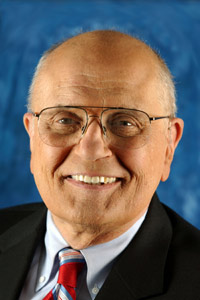
“Chairman Dingell understands that reliable, affordable energy production demands that our nation invest in a wide range of energy sources. He has long sought common sense solutions that bridge partisan divisions. While many Democrats may be serving as a committee chairman for the first time, Rep. Dingell has both the experience and the knowledge of what it takes to use this powerful position to achieve results. He also understands the difficult policy issues that will impact man-hours for our construction members.” — Bridget Martin, director of government affairs
JOHN DINGELL CHAIRED the Energy and Commerce Committee from 1981 until 1995, when Democrats lost control of the House. With the Democrats now back in power, Dingell will again lead this committee. Energy and Commerce is a vitally important committee for the Boilermakers. It deals with utility regulations, energy resources, environmental protection (including the Clean Air Act), and interstate and foreign trade. All of these areas involve work that Boilermakers do in construction and manufacturing. Energy and Commerce also deals with national health care and Medicaid, consumer protection, and telecommunications. In addition, it has oversight and investigatory responsibility for all the areas under its jurisdiction.
In 2005, the Boilermakers rated Dingell’s voting record a perfect 100 percent, as did the AFL-CIO. Although he is generally considered a progressive politician on labor, social, and environmental issues, he is somewhat conservative on abortion, and strongly opposes gun control.
Dingell’s district is located in the southeast corner of the state of Michigan. It borders Lake Erie to the east and Ohio to the south. The district includes portions of Washtenaw and Wayne counties and all of Monroe County, including Detroit’s southwestern suburbs.
In the 2006 midterm elections, Dingell received 88 percent of the vote. Candidates from three other parties (U.S. Taxpayers, Green, and Libertarian) split the balance. Dingell has served as a U.S. congressman since 1956, when he was elected to fill the unexpired term of his father, John Dingell Sr., who had died in office. Now 80 years old, Dingell has served in Congress for 51 years, making him the longest-serving member in the House and earning him the title, “Dean of the House.” Writing for the National Journal, political analyst Charlie Cook noted Dingell’s longevity and his advocacy for the environment, civil rights, Medicare, and other issues. Cook placed Dingell in the company of stalwart political leaders of the past, such as Sam Rayburn, who was House speaker for 17 years.
Key legislative/political positions
Over the past several years, Dingell has supported every key legislative position taken by the Boilermakers. He voted to strengthen OSHA, to protect overtime pay, and to repeal tax breaks for companies exporting jobs. He also voted against free trade treaties with Oman, Chile, Singapore, and with the Dominican Republic and Central America. He is a cosponsor of the Employee Free Choice Act. With his district located in the Detroit area, Dingell has also backed issues in support of the auto industry.
Dingell has introduced a bill for a national health care system every year that he has been in office. The bill is the same one offered by his father, who preceded him in Congress. Historically, Dingell has supported such major legislation as the Civil Rights Act of 1964, Medicare, the Clean Air Act of 1977, and the Clean Air Act Amendments of 1990. (The latter bills led to much of the environmental retrofit work that Boilermakers continue to perform today.)





